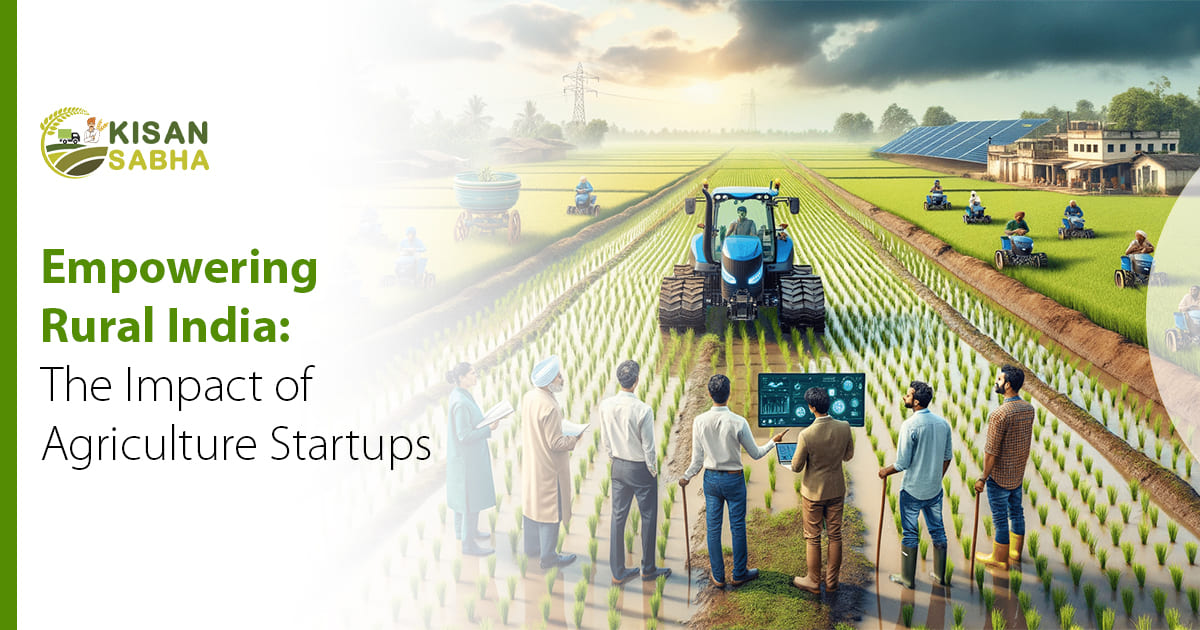Agriculture has long been the backbone of India’s economy, supporting millions of livelihoods and providing essential food supplies to the nation. However, traditional agricultural practices in rural India have faced challenges like low productivity, limited resource access, and outdated technologies. In recent years, the emergence of agriculture startups has brought transformative changes to the sector. These startups leverage technology, innovation, and entrepreneurship to address the unique needs of rural communities and enhance agricultural productivity. In this article, we will explore the impact of agriculture startups in rural India, focusing on their contributions to sustainable farming, livelihood enhancement, and rural development.
Introduction of Innovative Farming Technologies
Agriculture startups in India have introduced innovative farming technologies that have revolutionized traditional farming practices. From precision agriculture using drones and remote sensing to IoT-based smart farming solutions, these startups have enabled farmers to monitor crop health, optimize irrigation, and apply inputs more efficiently.
The introduction of such technologies has yielded a dual benefit: not only has it significantly boosted agricultural productivity. But it has also simultaneously promoted the sustainable use of resources, resulting in reduced water and chemical wastage.
Access to Market Information and Fair Pricing
Addressing a critical challenge faced by farmers in rural India, agriculture startups have bridged the gap in accessing market information and securing fair prices for their produce. Accordingly, these startups have developed mobile applications and online platforms to furnish real-time data on market prices, weather forecasts, and demand-supply trends. As a result, farmers are empowered to make educated decisions regarding crop selection, timing of sales, and transportation logistics. Moreover, by establishing direct connections between farmers and buyers while circumventing intermediaries, these startups ensure fair pricing, ultimately enabling farmers to secure a reasonable income for their hard work.
Financial Inclusion and Access to Credit
Access to credit and financial services has been a longstanding barrier for many smallholder farmers in rural India. Agriculture startups have collaborated with financial institutions to develop digital platforms that enable farmers to access loans, insurance, and other financial services easily. Through these platforms, farmers can build credit histories, and secure loans for purchasing seeds and equipment. As well as it helps them protect their crops against risks such as adverse weather conditions and pests. Improved financial inclusion strengthens rural economies and empowers farmers to invest in their farms and livelihoods.
Skill Development and Knowledge Sharing
In essence, agriculture startups contribute significantly to skill development and knowledge sharing among rural communities. Agriculture startups provide a range of educational platforms, including workshops, training programs, and online resources. Through these platforms, they effectively disseminate information on modern agricultural practices, sustainable farming techniques, and efficient resource utilization.
As a result of these initiatives, farmers acquire the knowledge necessary to adapt to changing climate conditions. In turn, this enables them to make informed, data-driven decisions for optimal crop management.
Women’s Empowerment in Agriculture
Women have always been an integral part of agriculture in rural India, but their contributions have often been overlooked. However, agriculture startups actively promote women’s participation and empowerment in agriculture by providing them access to information, technology, and resources. These startups offer training and support to women farmers, enabling them to take on leadership roles, access credit, and contribute more significantly to household income.
Reduction of Post-Harvest Losses
Post-harvest losses have been a significant challenge for Indian farmers, especially in the absence of proper storage and transportation facilities.
Agriculture startups have implemented creative solutions like mobile-based storage. Additionally, they have also introduced cold chain facilities which aid in reducing post-harvest losses and improving the shelf life of perishable produce. By minimizing wastage, farmers can maximize their profits and contribute to food security in the region.
Conservation of Natural Resources
Sustainable farming practices promoted by agriculture startups have led to the conservation of natural resources. Where as by adopting eco-friendly techniques like organic farming, crop rotation, and minimal tillage, farmers can maintain soil fertility, reduce water usage, and preserve biodiversity. These practices not only benefit the environment but also contribute to the long-term sustainability of agriculture in rural India.
Employment Generation and Rural Development
The growth of agriculture startups has resulted in increased employment opportunities in rural India.
The adoption of technology and innovative practices in the agriculture sector has led to the creation of new job roles. These roles span across various related sectors such as logistics, marketing, and agri-processing, expanding employment opportunities beyond direct involvement in agriculture startups. Indeed this holistic approach to rural development strengthens local economies, fosters entrepreneurship, and reduces migration to urban areas.
Climate Change Resilience
Climate change poses significant challenges for Indian agriculture, with unpredictable weather patterns and extreme events becoming more frequent. Whereas agriculture startups are actively working towards building climate-resilient farming practices. By providing real-time weather information, climate-adaptive crop varieties, and pest management solutions, these startups help farmers mitigate the impact of climate change and enhance their overall resilience.
Also Read:- 8 Keys to Successful Agricultural Marketing
Conclusion
Agriculture startups have emerged as powerful catalysts for change in rural India, transforming traditional farming practices and empowering farmers with knowledge, technology, and access to markets. Their impact on sustainable farming, financial inclusion, skill development, and women empowerment has been profound.
Agriculture startups are introducing innovative technologies and cultivating a spirit of entrepreneurship in rural communities. Through these initiatives, they are driving positive changes, resulting in increased agricultural productivity and enhanced rural development. As India continues to harness the potential of these startups, the future of agriculture in rural India is brighter.





